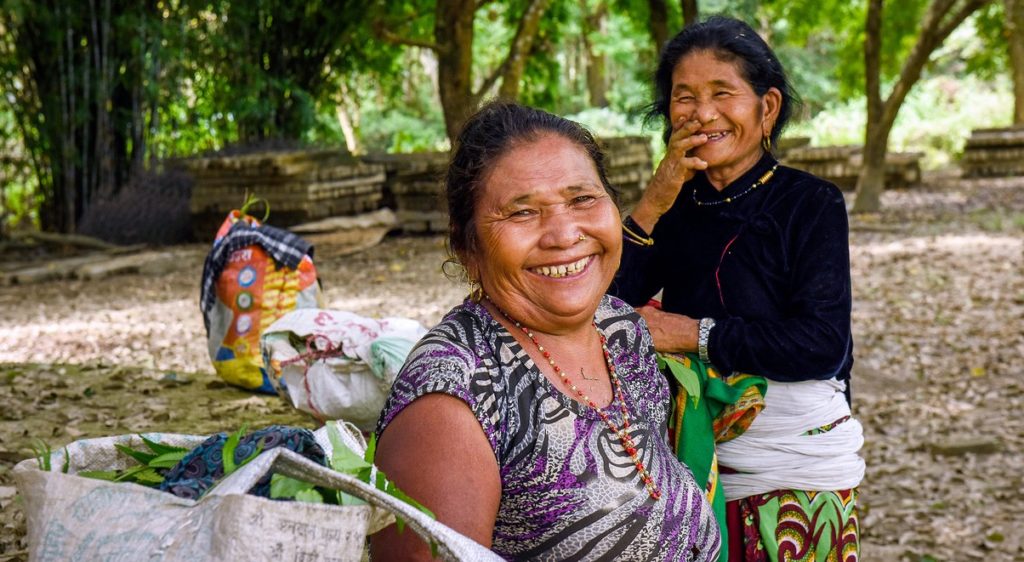The Focali – SIANI Dialogue Forum, in collaboration with Sida, Swedbio, The Tenure Facility and GGBC, will arrange a global online exchange on translating a Human rights-based approach (HRBA), for biodiversity and livelihoods, into policy and practice.
Watch the recording in English. La grabación está disponible en español también.
With the ongoing intertwined biodiversity, climate and inequality crises in focus, this exchange aims to bridge knowledge communities, policy and practice actors with a focus on human rights and biodiversity protection. The exchange will explore how a human rights-based approach can be “translated” into development cooperation, biodiversity policy, as the ongoing CBD negotiations, and into different local contexts across regions.
Via “bottom-up learning” messages, shared by representatives of Indigenous peoples and local communities (IPLCs) and associated partners, the exchange will further provide an opportunity for policymakers, program officers and negotiators to contextualize challenges and ways forward in safeguarding biodiversity, people’s lives and livelihoods. This will include the key roles that IPLCs and environmental human rights defenders play and the risks if their participation and rights are not sufficiently included in policy and implementation of conservation programmes. The event will further open for input from participants on related policy, practice and ways forward.
Translation between English, Spanish and Portuguese will be available and the event will be recorded. Registration is required to attend. Below you can find links to agendas in Spanish and Portuguese, please circulate these in your networks.
SPANISH: Haga clic aquí para registrarse y consulte aquí la agenda del evento
PORTUGUESE: Inscreva-se aqui para o evento. Verifique a agenda aqui
Contact the event coordinator Maria Ölund Focali – SIANI maria.olund@gu.se for questions.
Questions that will be addressed in the exchange:
1) What is a HRBA and how does it support the safeguarding of biodiversity, sustainable use and livelihoods?
2) What are the key roles of IPLCs and environmental human rights defenders in tackling biodiversity loss? What are the risks if IPLCs, their participation, rights and tenure is not sufficiently included in policy and implementation of conservation programs?
3) How can a human rights-based approach be translated into local contexts to global and vice-versa? How can HRBA and biodiversity be implemented into practice and policy at different levels?
Read this article, written by the SIANI intern Josefine Jacobsson, to dig into some of the concepts and themes that will be discussed during the event: A Human Rights-Based Approach to Safeguarding Biodiversity – What does it mean and why does it matter?
Agenda
13.00 Welcome
Instructions for translation and Zoom rules
Aim with the event and outline
Mentimeter interaction with the participants
13.05 HRBA for biodiversity and livelihoods – why, how and global policy developments
- David Boyd, UN Special Rapporteur on Human Rights and the Environment and Associate Professor of Law, Policy, and Sustainability at the University of British Columbia (recorded video)
- Soo-Young Hwang, Legal Officer with UN Environment Programme
Q&A Time
13.25 The role of Swedish international policy and development cooperation
- Cancelled talk, by the outgoing State Secretary to the Swedish Minister for International Development Cooperation, due to the new political landscape in Sweden.
- Anna Bolin, Programme Manager, Biodiversity and natural resources, The Swedish International Development Cooperation Agency, Sida
Q&A Time
Mentimeter interaction and optional break
13.55 Perspectives from Indigenous Peoples and environmental defenders
6 minutes per speaker and 10 minutes for questions to each pair of speakers
- Joan Carling, Global Director, The Indigenous Peoples Rights International (Video)
- José Gualinga, one of the Leaders of the Native People of Sarayaku, an Indigenous Kichwa Group in Ecuador’s Southern Amazon.
- Matilda Månsson, Legal Advisor International Affairs at Sametinget – Sámediggi – Sámi Parliament in Sweden
Q&A Time - Milka Chepkorir, Coordinator, Defending Territories of Life – ICCA Consortium and member of the Sengwer Indigenous Peoples of Cherang’any Hills, Kenya
- Juana Esquivel, Honduran Defender of Human Rights, and our Natural and Common Resources. Founding Partner and Current Director of the San Alonso Rodríguez Foundation.
Q&A Time
14.50 Translation, of HRBA – Biodiversity, between local realities, programmes and global policy
Open platform for reflections by participants, mentimeter and discussion
- Claudia Ituarte-Lima, Senior Researcher at the Raoul Wallenberg Institute
Concluding reflection to connect policy, practice and local realities
15.15 Closing of the main part of the event
15.20 – 15.30 Continued time for discussion on ways forward
Moderators:
Dr Stephen Woroniecki, Post-Doctoral Researcher at Linköping University, Department of Thematic Studies, Environmental Change Unit and Focali member.
Maria Ölund, Project Manager of Focali (Forest, Climate and Livelihood Research Network) and Focali – SIANI Dialogue Forum at Gothenburg Centre for Sustainable Development, GMV.
Speakers
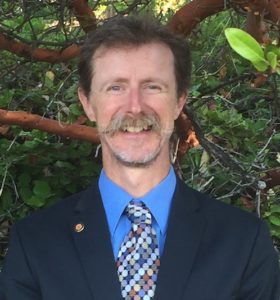
David Boyd, was appointed as the UN Special Rapporteur on human rights and the environment for a three-year term commencing August 1, 2018. He is an associate professor of law, policy, and sustainability at the University of British Columbia and holds a PhD in Resource Management and Environmental Studies from UBC. Mr. Boyd has a PhD in Resource Management and Environmental Studies from UBC. His career has included serving as the executive director of Ecojustice, appearing before the Supreme Court of Canada, and working as a special advisor on sustainability for Canadian Prime Minister Paul Martin.
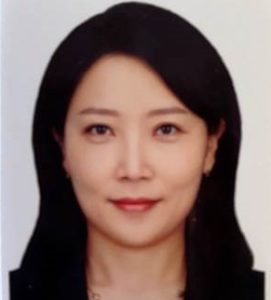
Ms. Soo-Young Hwang is a legal officer with the UN Environment Programme where she works on the advancement and implementation of environmental rule of law and environmental rights. Prior to joining UNEP, she worked with the UN Office of the High Commissioner for human rights working on economic, social and environment issues. She holds a Ph.D. in international relations, specializing in States’ compliance with international law and norm.
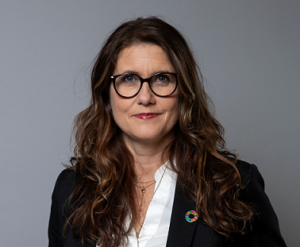
CANCELLED due to new political landscape in Sweden
Janine Alm Ericson, State Secretary to the Minister for International Development Cooperation overseeing Sweden’s Policy for Global Development and the development cooperation components of the Swedish Feminist Foreign Policy. Prior, Janine Alm Ericson was Group leader of the Green Party in the Riksdag, member of the Parliamentary Committee on Foreign Affairs and gender equality policy spokesperson.
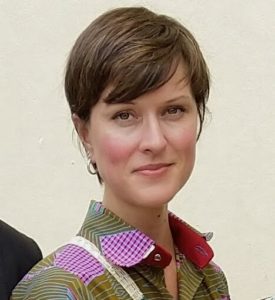
Anna Bolin, is a programme manager at the Unit Global Cooperation on Environment at the Swedish International Development Agency, Sida. Prior to joining Sida Anna worked as a researcher at the International Institute for the Environment and Development where she was focusing on action research and capacity building working with grassroots and producer organisations within the areas of forestry, enterprise development, and natural resource governance. Her current work focus on human rights in conservation, biodiversity and natural resource governance.

Joan Carling, Global Director, The Indigenous Peoples Rights International (IPRI). Joan is an Indigenous activist from the Cordillera. Her expertise includes areas like human rights, sustainable development, the environment, climate change, and additionally the application of Free, Prior and Informed Consent. She was the General Secretary of the Asia Indigenous People Pact (AIPP) From September 2008 to December 2016. She was appointed as Indigenous expert of the Permanent Forum on Indigenous Issues (2014-2016) by the United Nations Economic and Social Council. Photo: COP26/flickr.
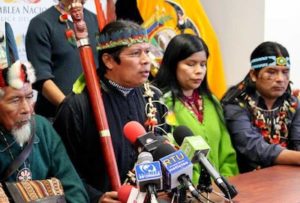
José Gualiga, one of the Leader of the Native People of Sarayaku, an Indigenous Kichwa group with 1400 inhabitants living in a remote part of Ecuador’s southern Amazon. Known for their defence of the rights of nature and Indigenous Peoples. In 2012, the Sarayaku won a historic victory at the Inter-American Court of Human Rights, which found that the Ecuadorian State had violated their rights by allowing an oil company to prospect in their territory without consultation.
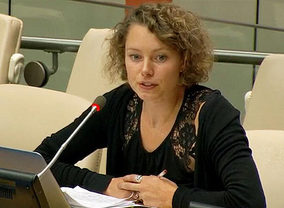 Matilda Månsson, Matilda Månsson is a legal advisor for international affairs at the Sámi Parliament in Sweden. In this capacity she coordinates work on issues relating to human rights, climate change, biodiversity and sustainable development and related international conventions. Since 2015 she assists the Sámi Parliament in its strive for increased legal protection and recognition of the rights of Sámi people to their lands, territories and resources, culture and self-determination.
Matilda Månsson, Matilda Månsson is a legal advisor for international affairs at the Sámi Parliament in Sweden. In this capacity she coordinates work on issues relating to human rights, climate change, biodiversity and sustainable development and related international conventions. Since 2015 she assists the Sámi Parliament in its strive for increased legal protection and recognition of the rights of Sámi people to their lands, territories and resources, culture and self-determination.
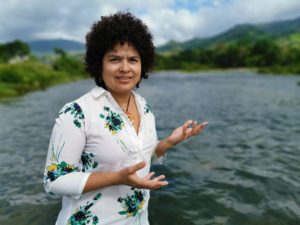
Juana Esquivel, Founding partner and current director of the San Alonso Rodríguez Foundation, partner organization to We-Effect. With 21 years of struggle and social work in the Aguan Region of Honduras and a strong commitment to gender justice and women’s rights, Juana Esquivel is part of movements of struggles of women fighters and defenders in her region and in the country. She is also part of the social movement in defence of the territory, and our natural and common resources. Member of the group promoting the National Network of Defenders. Photo: Jessenia Molina
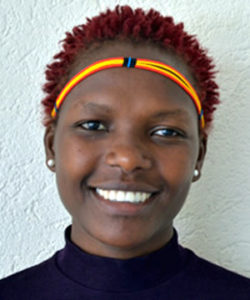
Milka Chepkorir, based in Kitale, Kenya. Milka is a member of the Sengwer Indigenous Peoples of Cherang’any Hills, Kenya. For the last six years, she has been working for the recognition of her community’s land rights. Currently, Milka coordinates Community Land Action Now (CLAN), a network of Kenyan rural communities striving to register their community lands. In 2020, she was an Environmental Justice Fellow at Natural Justice Kenya. Her interest in gender inclusion has informed her work with the community leadership and women to incorporate gender issues in the land rights struggle.
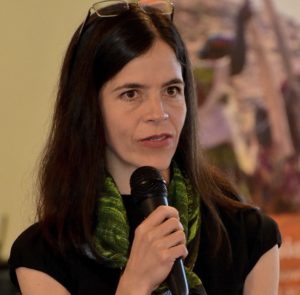
Claudia Ituarte-Lima is currently Senior Researcher at the Raoul Wallenberg Institute and is also affiliated with Stockholm University and the University of British Columbia. For the past twenty years, she has specialized in human rights, biodiversity and climate law. She has direct experience in international policy-making, including providing expert advice to the Secretariat of the Convention on Biological Diversity.
